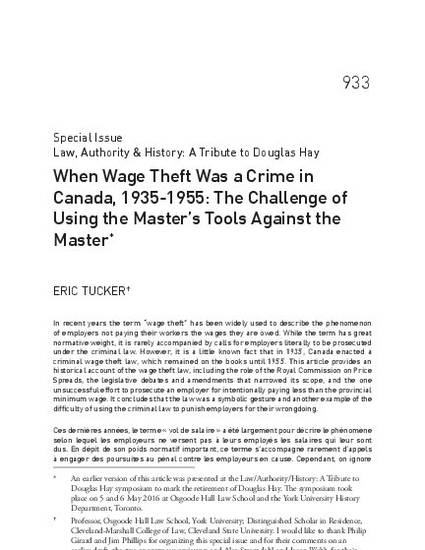
- Wages--Law and legislation--History,
- Canada
In recent years the term “wage theft” has been widely used to describe the phenomenon of employers not paying their workers the wages they are owed. While the term has great normative weight, it is rarely accompanied by calls for employers literally to be prosecuted under the criminal law. However, it is a little known fact that in 1935, Canada enacted a criminal wage theft law, which remained on the books until 1955. This article provides an historical account of the wage theft law, including the role of the Royal Commission on Price Spreads, the legislative debates and amendments that narrowed its scope, and the one unsuccessful effort to prosecute an employer for intentionally paying less than the provincial minimum wage. It concludes that the law was a symbolic gesture and another example of the difficulty of using the criminal law to punish employers for their wrongdoing.
Ces dernières années, le terme « vol de salaire » a été largement pour décrire le phénomène selon lequel les employeurs ne versent pas à leurs employés les salaires qui leur sont dus. En dépit de son poids normatif important, ce terme s’accompagne rarement d’appels à engager des poursuites au pénal contre les employeurs en cause. Cependant, on ignore souvent qu’en 1935, le Canada a promulgué une loi pénale sur le vol de salaire, qui est restée en vigueur jusqu’en 1955. Cet article fait la loi sur le vol de salaire et examine notamment le rôle de la Commission royale d’enquête sur les écarts de prix, les débats législatifs et les modifications qui ont réduit son champ d’application, ainsi que la vaine tentative de poursuivre un employeur qui versait délibérément des salaires inférieurs au salaire minimum provincial. L’article conclut que cette loi avait un caractère symbolique et qu’elle constitue un nouvel exemple de la difficulté à recourir au droit pénal pour sanctionner les actes répréhensibles des employeurs.
Available at: http://works.bepress.com/ericm_tucker/152/
